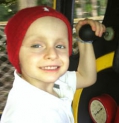Identifying novel biomarkers for risk stratification in t-cell acute lymphoblastic leukemia (ALL).
Cure rates for T-cell Acute Lymphoblastic Leukemia and Lymphoma (T-ALL/LL) have gone from 0% to approximately 80% over the past 4 decades. However, this success comes with a price. The incidence of both acute and long-term toxicities of intensive therapy is becoming increasingly common as more children survive their initial cancers. Moreover, despite intensive therapy, a significant number of children still relapse. Unfortunately, virtually none of these children can be cured with current therapy. Biomarkers that can distinguish children likely to survive from children likely to relapse exist for many pediatric malignancies. This enables tailoring of therapy such that low risk children are spared excessive toxicity while high-risk children can receive novel therapies. However, because biomarkers for T-ALL/LL are limited, all children are treated the same regardless of presenting symptoms. The goal of this project is identify novel biomarkers in T-ALL/LL that can be used to differentiate children with low- and high-risk disease. I hypothesize that the signaling networks, or ways cells communicate, in malignant T cells from children with high- versus low-risk disease will be distinct and could serve as biomarkers for tailoring therapy. I will use multiparameter flow cytometry, a highly sophisticated tool that allows one to analyze communication networks at the single cell level, to define these networks. These studies should provide valuable insights into the biology of T-cell malignancies and ultimately allow us to tailor therapy to an individual patient's risk for relapse as well as provided needed insights into potential targets for novel therapeutic approaches.

